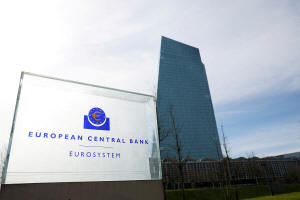Euro zone money supply shrinks as ECB turns off taps
 Send a link to a friend
Send a link to a friend
 [September 27, 2023] FRANKFURT
(Reuters) -The amount of money circulating in the euro zone shrank by
the most on record last month as banks curbed lending and depositors
locked up their savings, two tangible effects of the European Central
Bank's fight against inflation. [September 27, 2023] FRANKFURT
(Reuters) -The amount of money circulating in the euro zone shrank by
the most on record last month as banks curbed lending and depositors
locked up their savings, two tangible effects of the European Central
Bank's fight against inflation.
Faced with the highest inflation rates in its nearly 25-year history,
the ECB has turned off the money taps by jacking up interest rates to
record highs and withdrawing some of the liquidity it pumped into the
banking system over the previous decade.
The ECB's latest lending data on Wednesday showed this sharp increase in
borrowing costs was having the desired effect and may fuel a debate over
whether such a brisk tightening cycle may even push the 20-country euro
zone into a recession.
A measure of money supply comprising just cash and current account
balances shrank by an unprecedented 11.9% in August as bank customers
switched to term deposits now offering much better returns as a result
of the ECB's rate hikes.
The ECB's own research shows that a drop in this gauge of money, once it
is adjusted for inflation, is a reliable harbinger of recession,
although board member Isabel Schnabel said last week it was more likely
to reflect a normalization in savers' portfolios at this juncture.

A broader measure of money that also includes term deposits and
short-term bank debt also declined by a record-breaking 1.3%, showing
some money was leaving the banking sector altogether -- likely to be
parked in government bonds and funds.
[to top of second column] |

A view shows the logo of the European Central Bank (ECB) outside its
headquarters in Frankfurt, Germany March 16, 2023. REUTERS/Heiko
Becker//File Photo

"This paints a bleak picture for the euro zone's near-term
prospects," Daniel Kral, an economist at Oxford Economics, said. "We
now think GDP is likely to contract in Q3 and to stagnate in the
final quarter of this year."
Crucially, banks were also creating less money through loans.
Lending to businesses slowed to a near stand-still in August,
expanding by just 0.6%, the lowest figure since late 2015, from 2.2%
a month earlier. Lending to households rose just 1.0% after 1.3% in
July, the ECB said.
The monthly flow of loans to businesses was a negative 22 billion
euros in August compared to July, the weakest figure in over two
years, when the bloc was suffering through the pandemic.
"This is not good news for the eurozone economy, which is already
stagnating and showing increasing signs of weakness," said Bert
Colijn, an economist at ING. "We expect broad sluggishness to
continue as a result of the impact of restrictive monetary policy on
the economy."
(Reporting by Balazs KoranyiEditing by Francesco Canepa and Peter
Graff)
[© 2023 Thomson Reuters. All rights
reserved.]
This material may not be published,
broadcast, rewritten or redistributed.
Thompson Reuters is solely responsible for this content. |